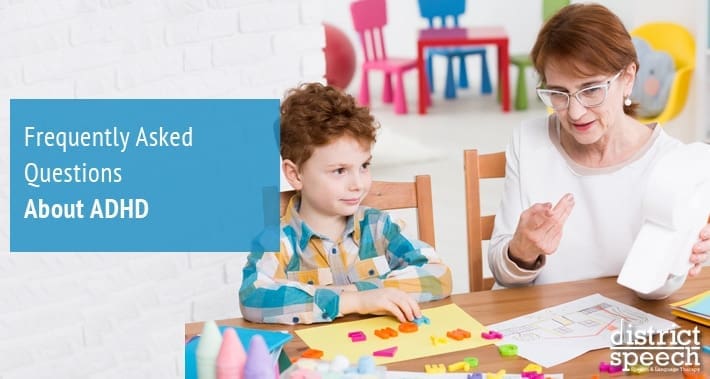
ADHD is a disorder that isn’t always easy to understand.
Maybe you or your child already has an ADHD diagnosis.
Or maybe you feel like you’ve always struggled with organization, time management, or inattentiveness, and wonder if ADHD is to blame.
These symptoms are all common in people with ADHD diagnoses.
But there’s much more to this disorder than what might typically come to mind when we think of ADHD.
Read on to find out answers for some of the most commonly asked questions about ADHD, and how an ADHD speech therapist can help you overcome some of the challenges of this condition.
What Is ADHD?
Attention deficit hyperactivity disorder, or ADHD, is a neurodevelopmental disorder.
Some of the signs of ADHD include:
- Difficulty focusing
- Inattentiveness
- Making frequent mistakes
- Forgetting to complete tasks
- Forgetting about appointments
- Being easily distracted
- Difficulty with self control
- Poor executive function
- Poor impulse control skills
- Frequent fidgeting
- Talking over others
- Impatience
Symptoms begin in childhood, which is why pediatric speech therapists are trained in ADHD treatment.
The majority of ADHD cases persist into adulthood though.
You may have had your symptoms overlooked in childhood, only to receive a diagnosis as an adult after being reassessed.
It’s less common, but adult speech therapists can also help with ADHD.
If you have ADHD, you may be at a higher risk for other speech or language disorders as well.
What Causes ADHD?
The exact cause of ADHD remains unknown, but there are a number of factors that may contribute to its development.
These factors include:
- Environmental influences
- Genetic factors
- Prenatal risks
- Physical differences in the brain
Traditionally, gender was also considered to be a contributing factor to ADHD.
However, new research suggests that the disorder affects a much larger number of girls and women than previously believed.
In the past, diagnosis focused on symptoms more common in young boys,
There is a strong genetic link associated with ADHD, with the disorder often running in families.
However, there doesn’t seem to be single cause of ADHD.
Ongoing research aims to better understand the various different potential causes.
How Common Is ADHD?
ADHD is considered one of the most common childhood neurodevelopmental disorders.
Studies suggest that ADHD affects around 3 to 5 percent of children, with some putting the numbers as high as 11 percent.
It’s estimated that between 30 to 65 percent of children with ADHD will continue to experience symptoms into adulthood.
The prevalence of ADHD varies between populations and countries.
If you have ADHD, the persistence of symptoms can have a significant impact on your daily life.
This can affect your ability to focus and complete tasks, as well as your relationships and overall well being.

What’s The Difference Between ADHD And ADD?
We used to distinguish between ADD and ADHD.
But today, they’re considered the same disorder.
There are currently three recognized ADHD subtypes.
What we used to call ADD is now called ADHD – predominantly inattentive.
What we used to call ADHD is now called ADHD – predominantly hyperactive impulsive type.
But there’s also ADHD combined type, a combination of symptoms of the previous two types
Many professionals and the general population still use the terms ADD and ADHD separately.
This can cause confusion if you are not familiar with the three subtypes.
At District Speech and Language Therapy, we use the term ADHD.
Is There A Link Between ADHD And Obesity?
Potentially, yes.
Adults and children with ADHD do appear to face difficulties in maintaining a healthy weight when compared to those without the disorder.
Research suggests that adults diagnosed with ADHD are 1.81 times more likely to be obese and 1.58 times more likely to be overweight than their non ADHD peers.
This might be related to the belief that ADHD brains lack dopamine.
Dopamine is a hormone that consumption of carbs and sugar can increase.
Studies do indicate that children receiving medication as part of their ADHD treatment plan are less likely to be overweight than those who did not take medication as part of their ADHD treatment.
Is There A Link Between ADHD And Smoking?
It’s possible, yes.
Adolescents diagnosed with ADHD are more susceptible to smoking from a very young age, according to recent studies.
Research also suggests that smoking rates are higher among ADHD teens than their peers, and adults with the condition also find it more challenging to quit.
Young people with ADHD tend to be twice as likely to develop nicotine addiction as those without it.
Does ADHD Affect Adults As Well As Children?
Yes.
While ADHD is often associated with childhood, it can also be a lifelong condition that requires ongoing management and support.
Studies show that some children will “grow out of” their ADHD symptoms.
But others will not.
An estimated 10 million adults are currently diagnosed with ADHD.
This is why it’s so important to bring your child in for a speech therapy evaluation as soon as possible.
Early diagnosis and intervention of your child’s ADHD will help them to better manage their condition as adults.
Adults with ADHD may also experience anxiety, depression, poor stress management, and substance abuse issues, particularly during early adulthood.
If you are an adult with ADHD, you may find these challenges can extend to your work and personal life.
This can lead to inconsistent performance at work or difficulty managing daily responsibilities.
Relationship problems and feelings of frustration, guilt, or blame are also common among adults with ADHD.
It is important to note, though, that you are not alone in these struggles, and that people with ADHD can still thrive with the right tools.
How Does ADHD Affect Speech?
The effects of ADHD on speech and language skills can vary widely between individuals.
If you have ADHD, you may be more likely to experience issues with articulation (the ability to produce certain speech sounds accurately).
You may also have issues with the fluency of your speech, like cluttering or stuttering.
In fact, in some cases, ADHD is actually identified through these types of differences.
With ADHD, you may also struggle to organize your thoughts while speaking, resulting in the use of filler words or the repetition of sounds and words.
Unfortunately, this can cause confusion and frustration for both you and your listeners.
How Can Speech Therapy For ADHD Help?
If you or your child struggle with ADHD, a speech therapist can help.
Speech therapy can show you some new strategies and techniques that will help you to better follow instructions, plan and organize, complete tasks, and stay focused.
Scheduling an evaluation with a speech therapist can be a crucial step after an ADHD diagnosis.
Your speech therapist will work closely with you to create a personalized treatment plan.
This can include a range of exercises and interventions tailored to your unique strengths, challenges, and needs.
By improving your speech and language abilities, as well as developing better listening and conversational skills, you can boost your overall communication capabilities and self confidence.
A speech therapist is a vital resource for anyone looking to effectively manage the challenges associated with ADHD.
Book Your Appointment With District Speech Today
An ADHD diagnosis doesn’t have to be scary.
If you or your child has been diagnosed with ADHD, a speech therapist can help address the challenges surrounding speech and language as it relates to the condition.
Our Washington DC speech pathologists can help you by providing the right tools to allow your ADHD brain to thrive when it comes to challenges with speech and language.
Book your appointment with District Speech today.
1300 I St NW, Suite 400 E,
Washington, DC 20005
- https://g.page/districtspeech
District Speech and Language Therapy specializes in speech therapy, physical therapy, and occupational therapy solutions, for both children and adults, in the Washington D.C and the Arlington Virginia areas.